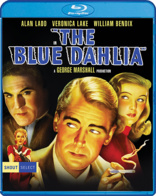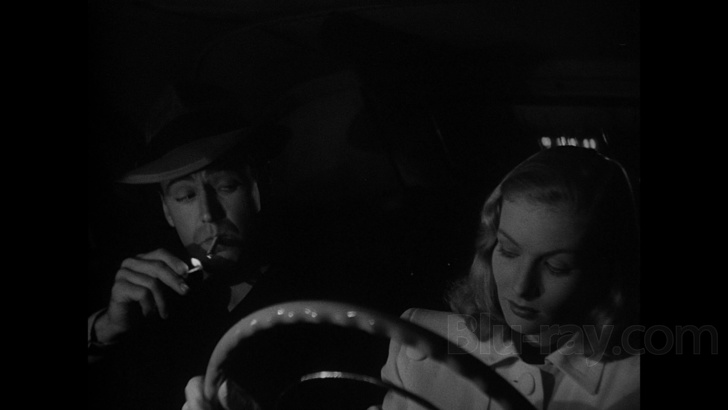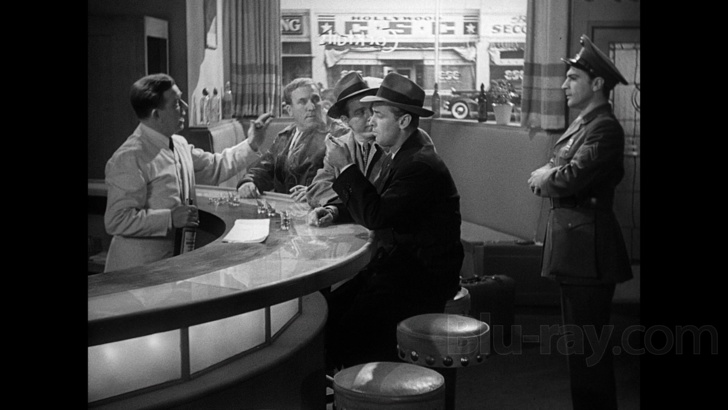The Blue Dahlia Blu-ray Movie
HomeThe Blue Dahlia Blu-ray Movie 
Shout Factory | 1946 | 100 min | Not rated | Nov 13, 2018
Movie rating
6.9 | / 10 |
Blu-ray rating
| Users | 4.5 | |
| Reviewer | 4.0 | |
| Overall | 4.0 |
Overview
The Blue Dahlia (1946)
When Johnny (Alan Ladd) comes home from the navy he finds his wife Helen kissing her substitute boyfriend Eddie, the owner of the Blue Dahlia nightclub. Helen admits her drunkenness caused their son's death. He pulls a gun on her but decides she's not worth it. Later, Helen is found dead and Johnny is the prime suspect.
Starring: Alan Ladd, Veronica Lake, William Bendix, Howard Da Silva, Doris DowlingDirector: George Marshall
| Film-Noir | Uncertain |
| Drama | Uncertain |
| Mystery | Uncertain |
| Crime | Uncertain |
| Thriller | Uncertain |
Specifications
Video
Video codec: MPEG-4 AVC
Video resolution: 1080p
Aspect ratio: 1.37:1
Original aspect ratio: 1.37:1
Audio
English: DTS-HD Master Audio 2.0 Mono (48kHz, 24-bit)
Subtitles
English SDH
Discs
Blu-ray Disc
Single disc (1 BD)
Playback
Region A (locked)
Review
Rating summary
| Movie | 4.5 | |
| Video | 3.5 | |
| Audio | 4.0 | |
| Extras | 3.0 | |
| Overall | 4.0 |
The Blue Dahlia Blu-ray Movie Review
Reviewed by Dr. Stephen Larson February 22, 2021The opening scene of The Blue Dahlia (1946) shows naval lieutenant and flyer Johnny Morrison (Alan Ladd) and two of his service buddies get off a bus in downtown Los Angeles. Johnny, Buzz Wanchek (William Bendix), and George Copeland (Hugh Beaumont) have recently returned from service in the South Pacific. (Johnny flew 112 missions.) After the trio enter a cafe to have drinks, a marine corporal (Anthony Caruso) begins playing swing music on a jukebox. Buzz, who has steel plate in his head from a bullet shell, can't stand the sound and asks the corporal to switch it off. When the man doesn't, Buzz pulls the plug which causes a fistfight. After getting punched, the corporal learns that Buzz is also a veteran. He forgives him for reacting in a shaken kind of way. Hearing loud music through hotel walls also provokes Buzz to ask the tenants to shut their music off. These scenes parallel the PTSD symptoms experienced by the characters played by Fredric March, Dana Andrews, and Harold Russell in William Wyler's The Best Years of Our Lives, which was also released the same year. Indeed, a scene depicting Andrews's Fred Derry in a service job where he's greatly irritated by another man's comments and gets in a quarrel has the same (if not more) resonance than the one at the beginning of The Blue Dahlia.
While Johnny doesn't encounter the same aftereffects from the war as Buzz, he has problems of his own to deal with at home. When he arrives at a cocktail party to see his wife, Helen Morrison (Doris Dowling), he notices she's with another man. As Helen is about to say goodbye to Eddie Harwood (Howard da Silva), Johnny catches them close together at the doorway. He punches Eddie for kissing his spouse, who's turned into a floozy. Johnny grows angrier when Helen informs him that they've lost their young son, who died in car accident. Before departing her quarters, Johnny leaves his naval .45, perhaps for someone to bump her off? Waking alone in the rainy night fifty miles away from his wife, Johnny is picked up by Joyce Harwood (Veronica Lake). She takes an instant liking to him but Johnny is a bit uncertain about his feelings for her. Joyce is separated from her husband Eddie, who owns the Blue Dahlia Cafe and nightclub. On the morning after Johnny and Joyce's car ride, it's announced on radio that Helen was found dead. Johnny is one of the prime suspects. Will he try to leave town?

Drive on a rainy night.
Screenwriter Raymond Chandler's plotting and performances by the leads surpass those in This Gun for Hire and The Glass Key. The blue dahlia is a fictitious set of flowers that Chandler employs as a Macguffin. While the audience probably knows who's involved in Helen's death, it's unclear who killed her and how. The film is a captivating whodunit and its fascinating to watch Johnny wade through these shady characters. Cinematographer Lionel Lindon is one of the unheralded stars in the production. His camera frames the characters with the brightly illuminated letters of the nightclub name atop in the background. There a shot where Johnny is waking up from being beaten in a farmhouse and the low-angle camera is with him as Eddie and his unscrupulous consigliere confer about their next move. We see Johnny's perspective though the bottom of a table. Lindon shot seventy-one pictures over his long career.
In its promotional material for the film, Paramount noted that Chandler had Ladd, Lake, and Bendix in mind when he wrote the screenplay. According to the writer's biographers, Chandler made a 120-page typescript that producer John Houseman bought for $25,000. Chandler adopted the unpublished manuscript into a screenplay but as Gene Handsaker of the Chillicothe (OH) Gazette wrote at the time, The Blue Dahlia entered production with only thirty-eight pages of the script completed. Chandler teased The Pittsburgh Press' Kaspar Monahan when he possibly pretended that he did not know the identity of the murderer in his own story. The Gazette (Cedar Rapids, IA) reported at another point only Chandler, Houseman, and director George Marshall knew the killer’s identity. The Gazette quoted Marshall as claiming no one on the set knew who committed the crime until the final day of filming. The Charlotte (NC) Observer chronicled in early March, 1946 at a pre-release press screening, critics "expressed an almost, unanimous inability to guess the identity of the killer." In his negative review of The Blue Dahlia, Eddie Bass of the Springfield (MO) Leader and Press made this observation: "Someone in the audience last night coughed at the moment when the killer was revealed—and we missed the climax of the picture."
Note: The Blue Dahlia was filmed predominately at the the Miramar Hotel in Santa Monica, on the Sunset Strip in Malibu, and in Encino. (Production notes provided by the Windsor Star.)
The Blue Dahlia Blu-ray Movie, Video Quality 

Shout Select's release of The Blue Dahlia comes with an MPEG-4 AVC-encoded transfer that fits on a BD-50. The picture appears in Academy ratio of about 1.37:1. This seems to be the same 2K restoration that Arrow Films used for its release five years ago. The grayscale and black levels demonstrate excellent delineation during the outdoor scenes shot at night. The print doesn't show off any bad damage marks. Light scratches (e.g., see the one on the side of Eddie's forehead in Screenshot #20), flecks, and very thin tramlines creep in from time to time. Though there isn't too noticeable of a telecine wobble, the frame is sometimes a bit shifty. I also observed some image flickering. This has more to do with the elements that Shout were given. Shout has encoded the feature at an average video bitrate of 25000 kbps. My video score is 3.75/5.00.
Shout provides a dozen chapters for the 99-minute film.
The Blue Dahlia Blu-ray Movie, Audio Quality 

Shout supplies a DTS-HD Master Audio Dual Mono (1563 kbps, 24-bit) as the sole sound track. The mix on the lower register of the aural spectrum but sufficiently picks up spoken words. The street-smart vernacular and slang that Chandler wrote in takes some time for the ears to get used to.
Reviewing The Blue Dahlia in 1946, Gilbert Kanour of The Evening Sun (NY) commented on some of these qualities: "Mr. Chandler's dialogue is often the speech that conceivably might be spoken under the circumstances and not a lot of odd sounds only slightly resembling conversation. But the tonic outcome is due as much to manner as to matter..." I heard some background hiss and a little buzz on the center channel. It's not terribly distracting since one only notices it in patches. I appreciated the main title theme that Victor Young wrote but the sound track doesn't really have a non-diegetic score once the opening credits conclude.
Optional English SDH (in a yellow font) can be switched on through the menu or via remote.
The Blue Dahlia Blu-ray Movie, Special Features and Extras 

- EXCLUSIVE Audio Commentary with Film Historians Alan K. Rode and Steve Mitchell - Rode and Mitchell discuss the making of The Blue Dahlia in this feature-length track. They talk about the careers of Raymond Chandler, Alan Ladd, Veronica Lake, William Bendix, and others as they're connected to this 1946 noir. They also contextualize the film as it fits into 1940s Hollywood. They spend a good deal of time disputing the veracity of an account written by producer John Houseman. Rode and Mitchell contend that it contains factual errors and improbabilities. Houseman's piece was published in the volume, The World of Raymond Chandler (Ed. Miriam Gross, 1977), and reprinted in his 1989 book, Unfinished Business: Memoirs, 1902-1988. In English, not subtitled.
- The 1949 Screen Guild Theater Radio Production of THE BLUE DAHLIA (28:27) - a half-hour presentation of The Blue Dahlia performed by Ladd, Lake, Will Wright, and another actor. Ladd narrates this archival recording delivered by the Screen Guild Players. The broadcast is broken up with ads for Camel cigarettes. The radio recording previously appeared on Arrow's 2016 BD-50 In English, not subtitled.
- Trailer (2:31, upconverted to 1080p) - Paramount's official trailer for The Blue Dahlia presented in 1.33:1 with a DTS-HD Master Audio Dual Mono mix (1829 kbps, 24-bit). Though unrestored, this vintage trailer isn't in bad shape at all.
- Photo Gallery (5:00, 1080i) - a slide show consisting of around sixty-six distinct images. They're retrieved from Paramount and Universal's vaults. The photo credits for some print "MCA TV" at the bottom, which would indicate the network version broadcast ca. 1958. The first fifty-four or so stills show some of the cast during filming. The vast majority are publicity shots of Alan Ladd, Veronica Lake, Howard da Silva, William Bendix, and Doris Dowling posing for photographers. They're reproduced from glossy black-and-white photo paper and look very clear here. Each image dissolves into the next. The last dozen comprise US and international posters from Paramount's ad campaign. These appear in color.
The Blue Dahlia Blu-ray Movie, Overall Score and Recommendation 

The Blue Dahlia is an outstanding postwar noir that's arguably the finest collaboration between Alan Ladd and Veronica Lake. There isn't a dull performance. Raymond Chandler's gripping story keeps the viewer focused on the mystery all the way through. Shout Select has delivered a very good transfer and lossless mono mix, which showing the obvious source-related limitations from the original Western Electric recording. The commentary track with two noir experts is unique to this package. HIGHLY RECOMMENDED to fans of Chandler, Ladd, and Lake.
Similar titles
Similar titles you might also like

The Glass Key
1942

Crossfire
Warner Archive Collection
1947

Mulholland Falls
1996

This Gun for Hire
1942

Phantom Lady
1944

I Wake Up Screaming
Hot Spot
1941

Impact
Collector's Edition
1949

Kiss Me Deadly
1955

Where the Sidewalk Ends
Limited Edition to 3000 - SOLD OUT
1950

Naked Alibi
1954

Murder, My Sweet
Warner Archive Collection
1944

Crime of Passion
1957

Out of the Past
Warner Archive Collection
1947

The Big Combo
1955

I Confess
Warner Archive Collection
1953

Criss Cross
1949

Mystery Street
Warner Archive Collection
1950

Somewhere in the Night
1946

The Stranger
1946

In the Heat of the Night 4K
1967